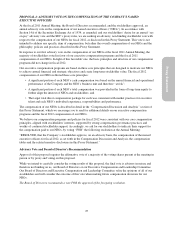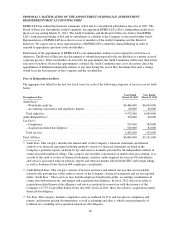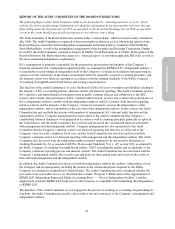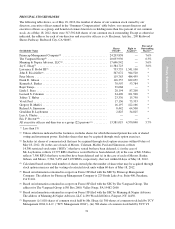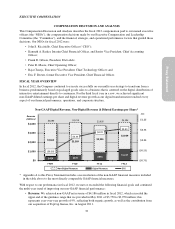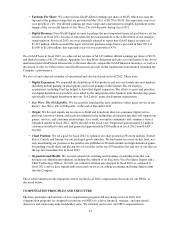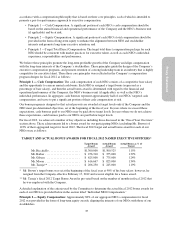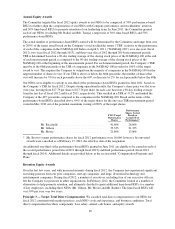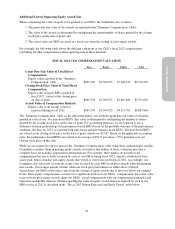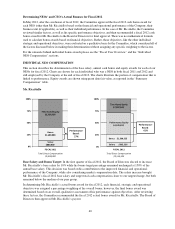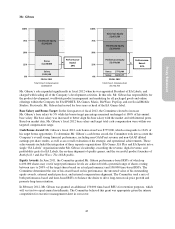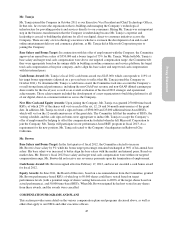Electronic Arts 2012 Annual Report Download - page 43
Download and view the complete annual report
Please find page 43 of the 2012 Electronic Arts annual report below. You can navigate through the pages in the report by either clicking on the pages listed below, or by using the keyword search tool below to find specific information within the annual report.
Proxy Statement
accordance with a compensation philosophy that is based on three core principles, each of which is intended to
promote a pay-for-performance approach to executive compensation:
• Principle 1 — Cash Compensation: A significant portion of each NEO’s cash compensation should be
based on the annual financial and operational performance of the Company and the NEO’s business unit
(if applicable) and be at risk;
• Principle 2 — Equity Compensation: A significant portion of each NEO’s total compensation should be
provided in the form of long-term equity to enhance the alignment between NEO and stockholder
interests and promote long-term executive retention; and
• Principle 3 —Target Total Direct Compensation: The target total direct compensation package for each
NEO should be consistent with market practices for executive talent, as well as each NEO’s individual
experience, responsibilities and performance.
We believe these principles promote the long-term profitable growth of the Company and align compensation
with the long-term interests of the Company’s stockholders. These principles guide the design of the Company’s
executive compensation programs, and promote retention of a strong leadership team in an industry that is highly
competitive for executive talent. These three core principles were reflected in the Company’s compensation
program designs for fiscal 2012 as follows:
Principle 1 — Cash Compensation: The cash compensation of each NEO consists of a competitive base salary
and the opportunity to earn an annual cash bonus. Each NEO is assigned a target bonus (expressed as a
percentage of base salary), and then the actual bonus award is determined with regard to the financial and
operational performance of the Company, the NEO’s business unit (if applicable), as well as the NEO’s
individual performance. In aggregate, cash bonuses represent approximately half of our NEOs’ targeted cash
compensation, and serve to put a significant portion of their cash compensation at risk.
Our bonus program is designed so that actual payouts are awarded at target levels only if the Company and the
NEO meet pre-determined objectives, set at the beginning of the fiscal year. In years where we exceed these
expectations, cash bonuses paid to our NEOs may be paid above target levels. In years where we do not achieve
these expectations, cash bonuses paid to our NEOs are paid below target levels.
For fiscal 2012, we achieved a number of key objectives including those discussed in the “Fiscal Year Overview”
section above. These achievements led to a bonus award for our participating NEOs (excluding Mr. Brown) of
123% of their aggregated target for fiscal 2012. The fiscal 2012 target and actual bonus award for each of our
NEOs were as follows:
TARGET AND ACTUAL BONUS AWARDS FOR FISCAL 2012 NAMED EXECUTIVE OFFICERS*
Target Bonus
Award
Actual Bonus
Award
Actual Bonus as % of
Target
Mr. Riccitiello ..................... $1,300,000 $1,500,525 115%
Mr. Barker ........................ $ 256,310 $ 355,000 139%
Mr. Gibeau ....................... $ 625,000 $ 775,000 124%
Mr. Moore ........................ $ 616,667 $ 825,000 134%
Mr. Taneja** ...................... $ 206,250 $ 245,000 119%
* Mr. Brown’s target bonus was set at the beginning of the fiscal year at 90% of his base salary; however, he
resigned from the Company effective February 17, 2012 and was not eligible for a bonus award.
** Mr. Taneja’s fiscal 2012 Target Bonus Award is pro-rated based on the number of months in fiscal 2012 that
he was employed with the Company.
A detailed explanation of the criteria used by the Committee to determine the actual fiscal 2012 bonus awards for
each of our NEOs is provided below in the section titled “Individual NEO Compensation.”
Principle 2 — Equity Compensation: Approximately 80% of our aggregate NEO’s compensation for fiscal
2012 was provided in the form of long-term equity awards, aligning the interests of our NEOs with those of our
stockholders.
35


